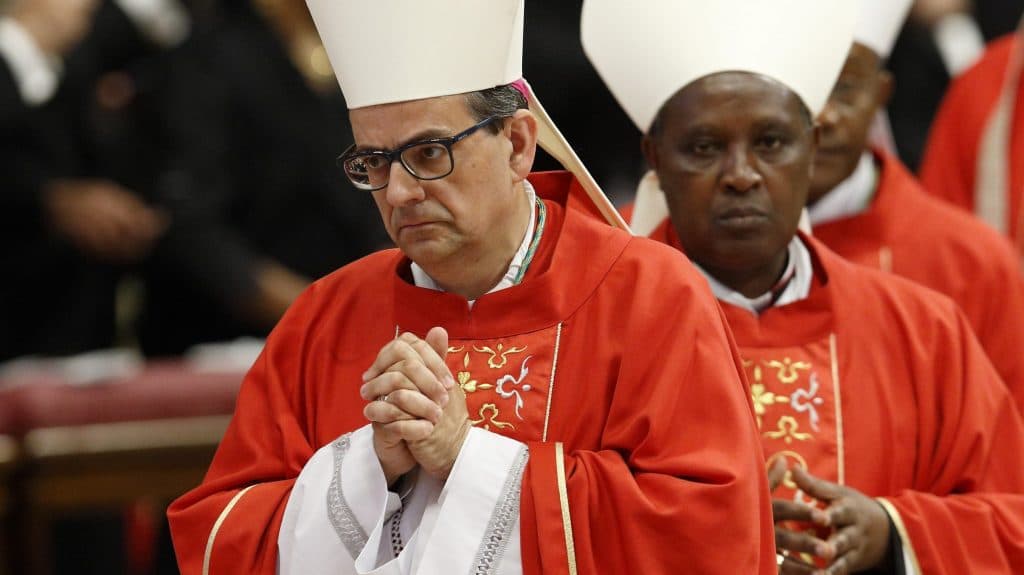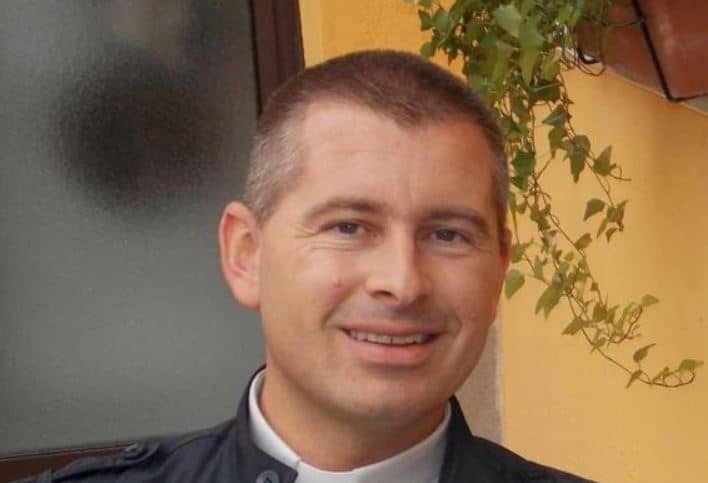ROME – Siena’s new cardinal-elect has said he sees a clear continuity between the pontificates of Benedict XVI and Francis, with the former providing the theological concept of charity and the latter its concrete application in pastoral practice.
“Pope Francis wants to bring the Church back to the radicality of the Gospel,” Cardinal-elect Augusto Paolo Lojudice said in an interview with Crux, adding that for him, Francis’s “pontificate and his magisterium are the logical consequence of that of Pope Benedict XVI.”
Pointing to Pope Francis’s first apostolic exhortation, Evangelii Gaudium, or “the Joy of the Gospel,” Lojudice said it was clear from the beginning in this tone-setting document that Francis is continuing “that great hymn to charity” that was found in Benedict XVI’s first encyclical, Deus Caritas Est, or “God is Love.”
“The first part is the theological one; the second is a practical application of charity,” he said, insisting that Benedict’s encyclical offers “not an abstract thought, but an embodied one.”
“And after great man of study and culture, Francis arrived with the continuity of an embodied experience which comes from the world and the context in which he was formed and was a priest and bishop,” he said.
Operating under this awareness, Lojudice, 56, said his goal once he gets his red hat is to “continue the course I started with the priesthood” and to “always remain who I am.”
Specifically, he said he will continue serving the Church and intends to comply with whatever is asked of him, specifically in Siena and wherever he goes in the future, “because what matters is to be embodied.”
On Oct. 25, Pope Francis announced that at the end of this month he would hold a consistory for the creation of 13 new cardinals, nine electors and four non-electors who have already passed the age of 80.
Lojudice, a former auxiliary bishop of Rome who since May 2019 has served as archbishop of Siena, is among the electors and is one of the youngest of the new cardinal-delegates.
When he first heard his name ticked off with the other 12 prelates getting a red hat, Lojudice said he was “almost petrified,” and never expected to be named a cardinal since he has been archbishop for less than a year.
However, he said “It didn’t surprise me that he did by surprise,” as Francis has made a habit of unexpected announcements and breaking protocol, such as naming cardinals for places that traditionally are not “red-hat” dioceses, such as Siena, and bypassing appointments where the crimson birettas are almost always given, such as Milan.
Lojudice recalled that in a meeting with the pope last year when he was named archbishop, Francis said that he had a devotion to his city’s most famous daughter, St. Catherine of Siena, who is the patron saint of Europe, and “had a lot to say to the cardinals and also to the popes.”
For Lojudice, to get a red hat is not like receiving a prize to say, “look how good you are,” but he believes Francis’s message in giving it is an order to “continue to dirty your hands as you have been.”
He noted that he is not Siena’s first cardinal, though the last one, Cardinal Antonio Felice Zondadari, oversaw the archdiocese from 1795-1823 during the Napoleonic conquest of Italy.
“For Pope Francis the fact of choosing to make cardinal the archbishop of Siena is part of his way of thinking: he does not remove you from a diocese just because, at least in recent centuries, it has not been a cardinalate see. This doesn’t matter to him: for him what counts is that he asks you something, that he trusts you and that you are faithful to him,” Lojudice said.
“It’s clear that he thinks, wants, desires, a Church according to the Gospel,” he said. “This should be the concern, not only the bishops and cardinals, but also every believer, that the Church is responsive to the Gospel. Everything we need is present in the Gospel and the pope only tries, with strength, to put it into action.”
Lojudice said his goal as a cardinal is to serve his diocese the best he can, and to be present to the people most in need.
Recalling his time as auxiliary bishop of Rome from 2015-2019, he noted that the situations in Rome and Siena are vastly different, especially in terms of poverty, but stressed that even at varying degrees, “poverty and frailties exist everywhere,” and he tries his best to read the situation and respond to concrete needs.
“I try to solve problems,” he said, “always remembering that the world has already been saved by the Lord, we must only participate in this salvation. It is a fact that I often repeat to myself.”
Lojudice said he believes a large part of his job, at least initially, will be continuing to manage the fallout from the coronavirus pandemic, particularly when it comes to supporting those “who are suffering the social and economic impact of the pandemic in a deep way.”
Calling for a “spirituality of rolled-up sleeves,” Lojudice said he intends to be the type of pastor Pope Francis has called for, one “with the smell of the sheep.”
The coronavirus, he said, is an opportunity to look back at the great saints in the Church’s history who also endured hardships, including plagues, which “helps us to understand that the life of faith has never been a walk in the park but is always a great commitment.”
Speaking to his countrymen in Italy, Lojudice quoted Pope Francis’s newest encyclical Fratelli Tutti on human fraternity, saying, “every day is offered to us a new opportunity, a new stage. We should not expect everything from those who govern us, it would be childish. We enjoy a space of co-responsibility capable of initiating and generating new processes and transformations. We must be an active part in the rehabilitation and support of wounded societies.”
This, Lojudice said, “is my wish for our beloved country, which can rediscover a strong sense of cohesive, supportive and merciful community.”
Though he does not yet know what changes his appointment might bring going forward, Lojudice said he sees the role of cardinal as one involving working more closely with the pope and changing one’s perspective from a local, to a global level.
Whatever else happens, he said, “what I know is that the Gospel has called me and is always calling me starting with the poor. Pope Francis teaches us not to confuse service with prestige, or rather, not to give prestige any space.”
Follow Elise Ann Allen on Twitter: @eliseannallen















